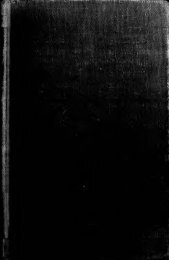Ecclesiastes - GA Barton - 1908.pdf
Ecclesiastes - GA Barton - 1908.pdf
Ecclesiastes - GA Barton - 1908.pdf
You also want an ePaper? Increase the reach of your titles
YUMPU automatically turns print PDFs into web optimized ePapers that Google loves.
62 ECCLESIASTES<br />
Woe unto thee, O land, whose king is a child,<br />
And whose princes feast in the morning.<br />
Happy art thou, O land, whose king is well-born<br />
And whose princes feast at the proper time,.<br />
As Hitzig has seen, v. 16 probably refers to the years after the<br />
reign of Ptolemy V had begun, when Agathoclea and her brother<br />
were the favorites in power (Justin, XXX, i), when revelry flour-<br />
ished, and when Antiochus III (the Great) at the height of his<br />
power was prosecuting those wars which, after inflicting much<br />
suffering upon them, robbed Egypt of her Palestinian dominions.<br />
Possibly, though it is by no means probable (see notes on 14 ff<br />
9 ), the<br />
reference to the city delivered by a wise man from the siege of a<br />
14 - 16<br />
powerful king (Q ) is a- reference to some incident of the wars of<br />
"<br />
Antiochus with Egypt. Probably Happy art thou, O land,<br />
whose king is well-born and whose princes feast at the proper time,"<br />
is Qoheleth's welcome of the strong rule of Antiochus III. Josephus<br />
tells us (Ant. xii, 3") that the Jews of their own accord went<br />
over to him, and welcomed him to Jerusalem, assisting him to take<br />
the citadel from the Egyptians. This passage apparently reflects<br />
the sentiments of that welcome. Qoheleth was, then,<br />
not com-<br />
pleted before 198 B.C. Its use by Ben Sira, on the other hand,<br />
makes it impossible that it should have been written much later<br />
than that year.<br />
On the whole, vague as these historical allusions are, they make<br />
it probable that Qoheleth did not finish his book until after the<br />
conquest of Antiochus III, about 198 B.C. Slight as the data are,<br />
they lead us with considerable confidence to place this work just<br />
at the end of the period which above we held open for it, if not to<br />
name the very year in which it was composed. This agrees with<br />
the judgment of Hitzig, Tyler, Cornill and Genung.<br />
The last of the third and the beginning of the second century<br />
/B.C. forms a fitting background for such a work as <strong>Ecclesiastes</strong>.<br />
The century which followed the death of Alexander was a trying<br />
century for the whole East, but especially so for Palestine. Pos-<br />
sessed by the Ptolemies, but claimed by the Seleucidae, Palestine<br />
found herself in the precarious position of an apple of discord.<br />
The gratitude which Seleucus I felt toward Ptolemy I for the aid





